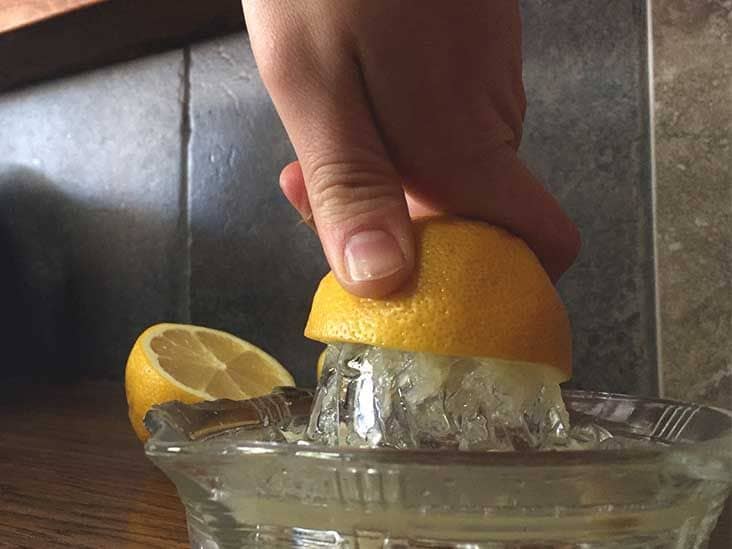
10 Home Remedies for Kidney Stones – Healthline
We include products we think are useful for our readers. If you buy through links on this page, we may earn a small commission. Here’s our process.
Healthline only shows you brands and products that we stand behind.
Staying hydrated can help pass kidney stones faster. Certain substances, including apple cider vinegar and lemon juice, may help dissolve kidney stones, making them easier to pass.
Drinking plenty of fluids can help pass kidney stones and prevent new stones from forming. The extra liquid flush can help out toxins, moving stones and grit through your urinary tract.
Adding certain ingredients to your water might have additional benefits.
If you have kidney stones, it’s best to talk with a doctor before trying any home remedies listed below. Some kidney stones may require medical treatment. Additionally, some herbal remedies may interact with certain medications or supplements. A doctor can determine whether these strategies are right for your type of kidney stone or if they could lead to additional unwanted effects.
If you have any chronic conditions, such as kidney or heart disease, talk with a doctor before using herbal remedies, as some can cause dangerous side effects.
If you’re pregnant or breastfeeding, avoid using any remedies and speak with a doctor. They can determine which treatment is safest for you and your baby.
Be sure to drink one 8-ounce glass of water immediately after drinking any flavored remedy. This can help move the ingredients through your system.
When passing a kidney stone, upping your water intake can help speed up the process.
Research suggests you should drink enough water to have about
You can also pay attention to the color of your urine. It should be a very light, pale yellow. Dark yellow urine is a sign of dehydration.
You can add freshly squeezed lemons to your water as often as you like. Lemons contain citrate, a chemical that
A great deal of lemon juice would probably be needed to make a huge effect, but some may have a small impact. A
Lemon has numerous other health benefits. For example, it helps inhibit bacteria growth and provides vitamin C.
Basil is full of nutrients. People have traditionally used basil juice for digestive and inflammatory disorders.
Basil contains antioxidants and anti-inflammatory properties. A
But more research on this remedy in humans is needed.
To try it, use fresh or dried basil leaves to make tea and drink several cups daily. You may also juice fresh basil in a juicer or add it to a smoothie.
It’s not known whether basil juice is safe to consume in large quantities or over more extended periods. Without more research, the long-term effects remain unclear.
Apple cider vinegar contains acetic acid. Acetic acid helps dissolve kidney stones.
In addition to flushing out the kidneys, apple cider vinegar may help ease pain caused by the stones.
Vinegar consumption
To try this remedy, add 2 tablespoons of apple cider vinegar to 6 to 8 ounces of drinking water.
Avoid consuming more than one 8-ounce glass of this mixture per day. You can also sprinkle apple cider vinegar onto salads or add it to your favorite salad dressing.
If ingested in larger amounts, apple cider vinegar can cause issues such as:
If you have diabetes and want to try this mixture, consider talking with a doctor and monitoring your blood sugar levels carefully throughout the day.
This mixture may interact with certain medications, including insulin or diuretics such as spironolactone (Aldactone).
Celery is used in some traditional medicines as a kidney stone remedy.
One study found that, on average, female participants with kidney stones ate less celery than female participants without kidney stones.
And a
Blend one or more celery stalks with water, and drink the juice.
Like other plant extracts, celery can interact with other medications or treatments, which may cause unwanted effects. It’s always best to check with a doctor before trying new remedies.
Pomegranate juice contains antioxidants, which may help keep the kidneys healthy. Some people believe it may help prevent kidney stones.
However, the National Kidney Foundation notes that it does not affect kidney stone prevention.
If you’d like to try it, it’s not clear how much pomegranate juice you can safely drink throughout the day, but a serving or two each day is likely reasonable for most people.
The
The broth from cooked kidney beans is a traditional dish often consumed in India. Some people claim it can improve urinary and kidney health, but there’s little evidence to say whether this remedy is effective. To try it, simply strain the liquid from cooked beans and drink it several times daily.
Depending on your type of kidney stone, a
The following home remedies may contain ingredients that may not already be in your kitchen. You may be able to buy them at your local health food store or online.
Parts of the dandelion plant may help eliminate waste, increase urine output, and improve digestion.
If you’d like to try it, you can make dandelion juice from the plant’s leaves or buy the roots as a tea or extract.
While small amounts of dandelion are likely safe for most people, it’s unknown whether consuming large quantities is safe. Some people can be allergic to dandelion, especially those with an allergy to:
High doses may be unsafe for people with certain health conditions, such as:
Talk with a doctor before taking dandelion root extract or other herbal remedies, as they may interact with some medications. If you’re taking diuretics, dandelion is typically not recommended.
Wheatgrass contains many nutrients and has long been used to enhance health. Wheatgrass may increase urine flow to help pass the stones. It also contains vital nutrients that help cleanse the kidneys.
Start with the smallest amount possible and gradually work up to the recommended serving to prevent side effects.
If fresh wheatgrass juice isn’t available, you can try powdered wheatgrass supplements as directed.
Taking wheatgrass on an empty stomach can reduce your risk of nausea. In some cases, it may cause appetite loss and constipation.
Horsetail is used as a diuretic to increase urine flow. A
The National Kidney Foundation notes that horsetail and certain other herbs may be unsafe to use if you have kidney disease.
You can have digestive side effects when using horsetail; some people may have allergies to it.
Horsetail isn’t recommended for children or people who are pregnant, breastfeeding or chestfeeding.
You may need urgent medical attention if you experience severe symptoms that include:
A doctor will determine whether you need medication or other therapy to help you pass the stone. Sometimes, a kidney stone can become trapped and cause an infection.
Small kidney stones can be passed naturally with plenty of fluids, and certain natural remedies may help dissolve them. Treatment is needed for larger stones causing severe pain or complications.
An endoscope
Drinking enough water can help your kidney stones pass with less pain, but there is usually some pain or discomfort until they pass. Medications like nonsteroidal anti-inflammatory drugs (NSAIDs) can help you manage it.
Other than water, you can try things like wheatgrass juice, kidney bean broth, celery juice, or lemon juice.
Although it may be uncomfortable, passing a small kidney stone on your own is possible.
You can take over-the-counter (OTC) pain relievers to lessen any pain you may be experiencing. These include:
Be sure to follow a doctor’s instructions until the stone passes, and don’t drink alcohol.
Once you pass a kidney stone, you may want to save it to take to a doctor for testing. To save the stone, you need to strain your urine.
You can do this by using a urine screen, which you can get from the doctor’s office. A doctor can determine what kind of stone it is and develop a targeted prevention plan.
Talk with a doctor about lifestyle changes you can make to help prevent more stones from forming. Always check in with a doctor before trying home remedies, herbs, or supplements.
Herbs and supplements aren’t regulated for quality and purity by the Food and Drug Administration (FDA), so research your choices and sources for purchase.
A recent analysis of 27 different supplements for kidney health found that two-thirds of them included ingredients that have no research to support their use.
Read this article in Spanish.
LetsGetChecked
Last medically reviewed on January 11, 2024
Our experts continually monitor the health and wellness space, and we update our articles when new information becomes available.
Current Version
Jan 17, 2024
Written By
Emily Cronkleton
Edited By
Alina Sharon
Copy Edited By
Copy Editors
Jan 11, 2024
Medically Reviewed By
Avi Varma, MD, MPH, AAHIVS, FAAFP
VIEW ALL HISTORY
Share this article
OUR BRANDS

